Rules of Narration With Examples And Chart, Table
Rules of narration have been explained thoroughly step by step here. Knowing the rules of narration is very important to improve your English. If you want to learn all the rules of narration, you must read the article carefully and follow the examples. The rules are
- Rules for time and place
- Rules for tense
- Rules for person
- Rules for assertive sentences
- Rules for interrogative sentences
- Rules for imperative sentences
- Rules optative sentences
- Rules for exclamatory sentences
This is the easiest way to learn direct and indirect narration because I have taught many students through offline and online YouTube channel. I am sure that you can learn narration change by reading the article.
So we should not waste time. Let’s get started with the rules of narration.

Rules of Narration for Time and Place
There are several words and phrases related to time and place. We need to turn it into indirect speech. The terms and phrases are listed below.
Rules of Narration for Time and Place Table
| Direct Speech | Indirect Speech |
| Now | Then |
| Here | There |
| This | That |
| These | Those |
| Come | Go |
| Thus | So/that way |
| Hither | Thither |
| Hence | Thence |
| Ago | Before |
| Today | That day |
| This day | That day |
| Tonight | That night |
| Tomorrow | The next day |
| Yesterday | The previous day |
| Last night | The previous night |
| Next week | The following week |
| Yesterday morning | The previous morning |
Example:
Direct: You said to me, “I have taken this book.”
Indirect: You told me that you had taken that book.
Direct: Rupa said, “I was writing a note last night.”
Indirect: Rupa said that he had been writing a note the previous night.
Rules of Narration for Tense
If the reporting verb is in the present or future tense, the tense in the reported speech is not changed.
Rules of Narration for Tense Table
| Reporting Verb (Present Tense/Future) | Direct Speech | Indirect Speech |
| Simple Present | No Change | |
| Present Continuous | No Change | |
| Present Perfect | No Change | |
| Present Perfect Continuous | No Change | |
| Simple Past | No Change | |
| Past Continuous | No Change | |
| Past Perfect | No Change | |
| Past Perfect Continuous | No Change | |
| Simple Future | No Change | |
| Future Continuous | No Change | |
| Future Perfect | No Change | |
| Future Perfect Continuous | No Change |
Example:

Direct: Ramen says, “I am good.”
Indirect: Ramen says that he is good.

Direct: He will say, “I am prepared for the exam.”
Indirect: He will say that he is prepared for the exam.
If the reporting verb is in the past tense, the tense in the reported speech needs to be changed into the corresponding past form.
Rules of Narration for Tense Table Chart
| Reporting Verb (Past) | Direct Speech | Indirect Speech |
| Simple Present | Simple Past | |
| Present Continuous | Past Continuous | |
| Present Perfect | Past Perfect | |
| Present Perfect Continuous | Past Perfect Continuous | |
| Simple Past | Past Perfect | |
| Past Continuous | Past Perfect Continuous | |
| Past Perfect | Past Perfect | |
| Past Perfect Continuous | Past Perfect Continuous | |
| Simple Future | Would/ should | |
| Future Continuous | Would/ should | |
| Future Perfect | Would/ should | |
| Future Perfect Continuous | Would/ should |
Example:

Direct: Nirmal said, “I am reading a newspaper.”
Indirect: Nirmal said that he was reading a newspaper.
Direct: You said to me, “You have missed the train.”
Indirect: You told me I had missed the train.
Direct: The man said, “I was taking a rest under the tree.”
Indirect: The man said that he had been taking a rest under the tree.
Direct: She said to Rima, “You went to market.”
Indirect: She told Rima she had gone to market.
Rules of Narration For Changing Persons
- Rules for first person
If the subject of reported speech is first person (I, We), it indicates the subject of reporting verb. Or
I, my, me, we, us and our are changed on the basis of the subject of reporting verb.
Example:

Direct: Kamal said to me, “I have eaten five mangoes with my sister.”
Indirect: Kamal told me that he had eaten five mangoes with his sister.
Direct: The students said to me, “We have written the sentences.”
Indirect: The students told me that they had written the sentences.
- Rules for the second person
If the subject of reported speech is second person (you, you), it indicates the object of reporting verb. The person is changed flowing them. Or
You and your are changed on the base of the object of reporting verb.
Example:

Direct: The vendor said to me, “You will take your bottle.”
Indirect: The vendor told me that I would take my bottle.
Direct: She said to the boy, “Your brother called you last night.”
Indirect: She told the boy that his brother had called him the previous night.
- Rules for the third person
If the subject of reported speech is third person (He, She, It, They, Ram, Kamal and Gopal), it does not indicate the subject and object of reporting verb. So it is not necessary to change.
Example:

Direct: Gopal said to me, “The apples are ripe.”
Indirect: Gopal told me that the apples were ripe.
Direct: We said to you, “He is not a smart person.”
Indirect: We told you that he was not a smart person.
Rules of Narration For Assertive Sentences
- Rules of Narration 01
The Reporting Verbs of Direct Speech like Say to, said to are changed into tell, told. After that, we use “That” instead of the comma mark (,).
Example:
Direct: Rana says to you, “I have finished my homework”.
Indirect: Rana tells you that he has finished his homework.
Direct: The lady said to the boy, “You are telling a lie.”
Indirect: The lady told the boy that he was telling a lie.
- Rules of Narration 02
If the reporting verb is in the past tense and we find universal truth and habitual fact in the reported speech we can not change the tense of reported speech in indirect speech.
Example:
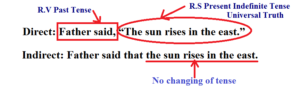
Direct: Grandfather said, “God is almighty.”
Indirect: Grandfather said that God is almighty.
Direct: The girl said to us, “We do exercise at down daily.”
Indirect: The girl told us that they do exercise at down daily.
- Rules of Narration 03
If we find two or more than two past indefinite tenses in the reported speech of direct narration, those sentences remain unchanged in indirect narration.
Example:

Direct: The grandfather said, “My daughter was good and kind and she respected everyone.”
Indirect: The grandfather said that his daughter was good and kind and she respected everyone.
Rules of Narration For Interrogative Sentences
When we change the direct speech of the interrogative sentences into indirect, we use “Ask/Enquire/Want to know” instead of “Say”. Then we use “If/Whether” if we do not get an interrogative sentence with Wh-words. Next, we use a full stop instead of a question mark.
For Example:
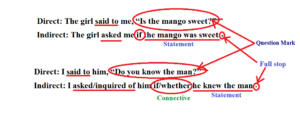
Direct: She said to me, “Do you use a smartphone?”
Indirect: She asked me if I used a smartphone.
Direct: Kiran said to the girl, “Will you like me?’’
Indirect: Kiran asked the girl whether she would like him.
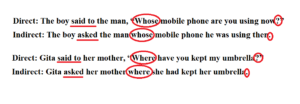
Direct: The teacher said to the student, “Why are you making noise in the classroom?”
Indirect: The teacher asked the student why he was making noise in the classroom.
Direct: My friend said to me, “How did I solve the problem?”
Indirect: My friend asked me how he had solved the problem.
Rules of Narration For Imperative Sentences
- Rules of Narration 01
We use “Order/ request/ advise/ command” instead of “Say/ Say to”, when we do narration changes of imperative sentences.
Then we use “To” for affirmative sentences and “Not to” for negative sentences instead of comma marks.
OR
We can use “Prohibit/Forbid” instead of “say/ say to” and use “To” instead of a comma mark in indirect narration.
Example:
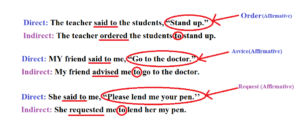
Direct: The teacher said to the students, “Close the window.”
Indirect: The teacher ordered the students to close the window.
Direct: The lady said to you, “Please give me a glass of water.”
Indirect: The lady requested you to give her a glass of water.
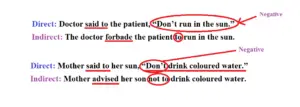
Direct: Father said to me, “Do not hate the poor.”
Indirect: Father advised me not to hate the poor.
Indirect: Father forbade me to hate upon the poor.
- Rules of Narration 02
If we find “Us” after “Let” in the reported speech of the imperative sentence, we use “Propose to/ suggest to” instead of “Say/say to” and use that instead of the comma mark (,). Then we avoid “Let us” and follow sentence structure [S+ should +v…]
Example:
Direct: He said to me, “Let us go out for a walk.’’
Indirect: He proposed to me that we should go out for a walk.

Rules of Narration 03
If we do not find “Us” after “Let” in the reported speech of the imperative sentence, we use “Tell/request/wish” instead of “Say/say to” and use “That” instead of a comma mark (,). Then we avoid “Let” and follow sentence structure [S+may/may+be+allowed+to+V+O….]
Example

Direct: He said, “Let me finish this work.”
Indirect: He wished that he might be allowed to finish that work.
Direct: I said to you, “Let her sing a song.”
Indirect: I told you that she might sing a song.
Rules of Narration For Optative Sentences
- Rules of Narration 01
If we find the word “God” in the reported speech of an optative sentence we use “Wish / Pray/bless” instead of “Say”. We replace commas with “That”. Then we follow the sentence structure [S + may + v + o] at the time of narration change.
Example
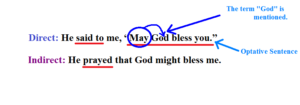
Direct: He said to me, “May God bless you.”
Indirect: He prayed that God might bless me.
Rules of Narration 02
If we do not find the word “God” in the reported speech of the optative sentence we use “Wish” instead of “Say”. We replace commas with “That”. Then we follow the sentence structure [S + may + v + o] at the time of narration change.
For Example:
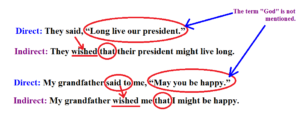
Direct: They said, “Long live our president.”
Indirect: They wished that their president might live long.
Rules of Narration For Exclamatory Sentences In Table
Exclamatory Sentence
| Direct | Direct | Indirect |
| say | Hurrah | Exclaim with joy |
| Alas | Exclaim with sorrow/grief
Exclaim sorrowfully |
|
| Surprise | Exclaim with surprise | |
| Greetings | Wish | |
| Desire | Strongly wish/desire | |
| Goodbye | Bid (Bade in past) |
Rules of Narration For Exclamatory Sentences
- Rules of Narration 01
When we find greetings and goodbye in the reported speech of exclamatory sentence, we use “Wish/Bid”. After using those we do not use “That” but use the object.
For Example
Direct: She said to me, “Good morning.”
Indirect: She wished me good morning.
- Rules of Narration 02
If the reported speech starts with “How/ What” and we find an “Adjective/ Noun”, we use “Very / Completely” before the adjective and “Great” before the noun at the time of changing narration.
For Example:
Direct: They said, “How happy we are here!”
Indirect: They exclaimed with joy that they were very happy there very happy there.
Direct: He said, “What a fool I am!”
Indirect: He exclaimed with sorrow that I was a great fool.
- Rules of Narration 03
When we find happiness, gladness and surprise in exclamatory sentences, we use “exclaim with joy, exclaim with Sorrow/grief, exclaim sorrowfully, exclaim with surprise”.
For Example:
Direct: The boys said, “Hurray! We have won the match.”
Indirect: The boys exclaimed with joy that they had won the match.
Direct: Simanta said, “Alas! I have lost the book.”
Indirect: Simanta exclaimed with sorrow/grief that he had lost the book.
Direct: The boy said to me, “What a smart girl!”
Indirect: The boy exclaimed with surprise me that the girl was very smart.
- Rules of Narration 04
When we find desire in the exclamatory sentence, we use “strongly wish”.
For Example:
Direct: The old man said, “Were I a king!”
Indirect: The old man strongly wished that he were a king.
Direct: Ramesh said, “Had I much money!”
Indirect: Ramen strongly wished that he had much money.
Read More
- Narration Change
- Voice change
- Type of sentence
- Degree Change
- All Conditional Sentences
- Transformation of Sentences [Affirmative to Negative]
- Transformation of sentences [Simple, Complex and Compound]
If you think that this article (Rules of Narration) is good and necessary, you can share it with your friends and relatives through social media like WhatsApp, Facebook and Messenger. Thank you! – Prakash sir